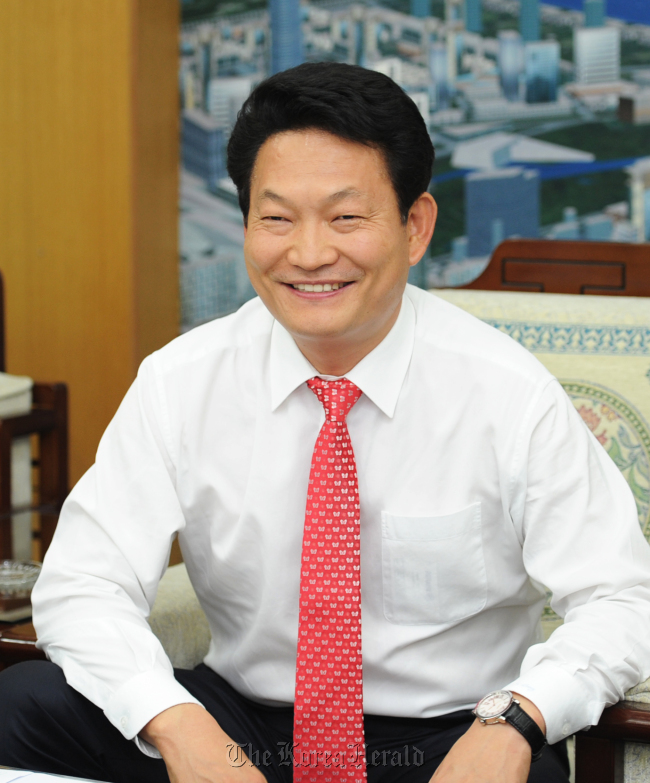Incheon mayor vows full support for U.N. green fund
Incheon Mayor Song Young-gil is confident that Songdo, the city’s newly developed urban district, has all that U.N. officials seek for the location of its new, ambitious Green Climate Fund.
On top of its excellent IT and financial infrastructure, the area is designed as a model town that embodies the country’s vision of “low-carbon, green growth.”
“Songdo is a model of low-carbon green cities which the United Nations Framework Convention on Climate Change seeks to spread across the globe,” Song said in a written interview with The Korea Herald.
 |
Incheon Mayor Song Young-gil |
The mayor is leading the city’s bid to host the U.N.-operated fund, envisioned to be the single largest source of financing for global efforts to combat climate change.
Competitors include Bonn of Germany and Geneva of Switzerland. A decision is expected in mid-October at the fund’s board meeting in Songdo.
The mayor stressed Songdo’s efforts to offset greenhouse gas emissions and maximize the reuse of energy and resources.
It has set a voluntary target to reduce carbon emissions to 38 percent below projected levels by 2020. Thirty-two percent of the total area is designated as green space that will offset the carbon emitted.
A sewage recycling system and one of the largest pneumatic waste collection systems in the world have been built to achieve the goals of reusing 40 percent of waste water and 76 percent of other wastes, he explained.
The I-Tower, where the GCF office would be housed, is an eco-friendly building tailored for international organizations.
Designed to meet U.N. security requirements, ten international organizations including the U.N. Asian and Pacific Training Centre for Information and Communication Technology for Development (UN-APCICT), regional/sub-regional offices of the U.N. Economic and Social Commission for Asia and the Pacific (UNESCAP) and U.N. International Strategy for Disaster Reduction (UNISDR) are already planning to relocate their offices to the building. Construction is due for completion later this year.
Above all, Song stressed that the fund should come to Korea and Asia, given that no international environmental organizations are located here.
“The objectives of the GCF can be obtained only when developing countries actively engage in efforts to fight climate change,” he said.
“Korea, understanding the concerns that many developing countries, hopes to serve as their bridge to richer countries. If the GCF is based here, it will be an encouraging sign for developing countries.”
He also vowed full support for early and smooth establishment of the secretariat, should it come to Incheon.
“We had a record of handling all the necessary procedures within just two months for the opening of UNESCAP’s North Asian office,” Song explained.
Furthermore, Korea’s central government, parliament and the general public are all strongly supportive of Incheon’s bid, he said.
“If Incheon is selected, it would greatly boost the international profile of the city as well as of Korea in the global environmental field, and bring in significant economic benefits,” he added.
The Korea Development Institute, a state-run think tank, estimated the expected benefits to be about 380 billion won ($341 million) a year, presuming that the GCF keeps a workforce of 500 here.
By Lee Sun-young (
milaya@heraldcorp.com)








